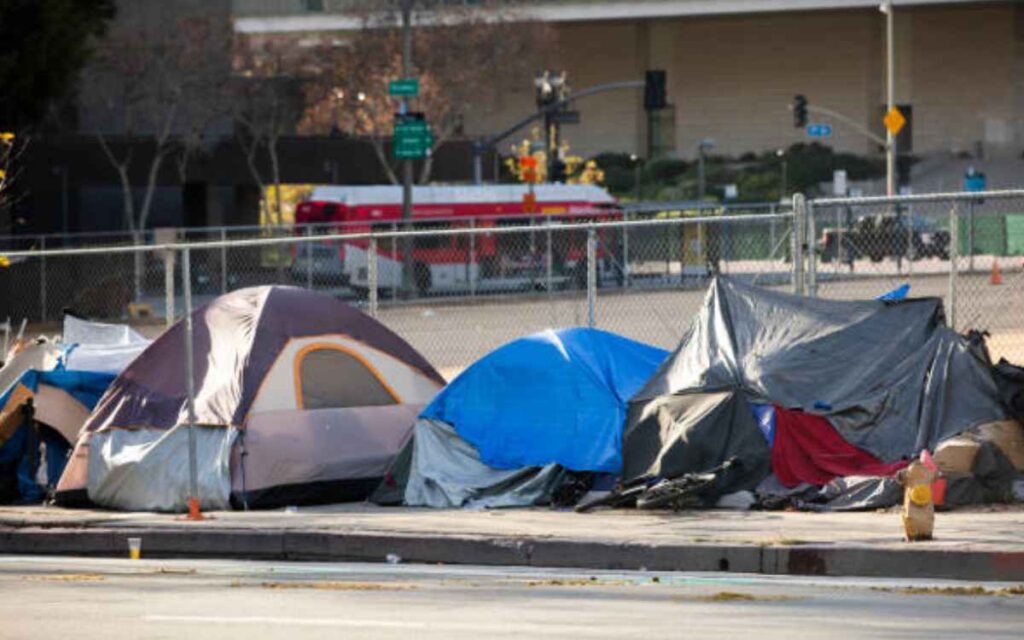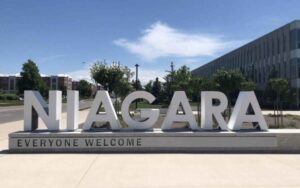
Mayors Mat Siscoe, Frank Campion, and Jim Diodati are supporting Ford using the notwithstanding clause to address encampments. Photo Credit: iStock.
The homelessness epidemic is intensifying in both size and scope across the Niagara Region, as it is throughout Ontario and Canada. In response, homeless encampments have been erected to service vulnerable people’s needs, but in many cases, they are being constructed near neighbourhoods and schools.
Residents of various communities have been vocalizing serious concerns as they have witnessed dangerous and illegal activities taking place at these encampments, including human trafficking, the use of drugs, and the defecating of public property. The grave nature of this matter has Premier Doug Ford considering whether to invoke Section 33 of the Canadian Charter of Rights and Freedoms, the notwithstanding clause, to provide law enforcement with additional tools and authority to break up encampments that are in inappropriate locations.
The notwithstanding clause affords Canadian federal and provincial governments the ability to temporarily limit some sections of the Canadian Charter of Rights and Freedoms, including court rulings. The notwithstanding clause is one of the most controversial components of the Canadian Charter of Rights and Freedoms and has generally been used sparingly.
In this context, the main purpose of the notwithstanding clause would be to temporarily override a January 2023 ruling, made by the Ontario Superior Court of Justice. The court’s decision, which was issued by Justice M.J. Valente, struck down a Region of Waterloo bylaw that would have allowed for the eviction of roughly fifty people from publicly owned land in Kitchener because doing so would violate the evictee’s right to life, liberty and security of the person, as specified in Section 7 of the Canadian Charter of Rights and Freedoms.
Valente said that the bylaw could not be applied to evict individuals from public property, nor disallow them from building and living in temporary housing shelters without a permit on this property if the number of accessible shelter beds in the region is not greater than the number of homeless persons in need of them.
Earlier this fall, Ford requested that Ontario’s Big City Mayors formally request, in written form, that they would like for him to utilize the notwithstanding clause to resolve this pertinent issue. Thirteen mayors responded by delivering a letter to Ford asking him to proceed.
One of the original signatories was St. Catharines Mayor Mat Siscoe. While Siscoe does not seek to simply remove shelters, when people have nowhere to go, he strongly believes that it is necessary to be able to move encampments away from residential properties and schools.
The list of mayors asking Ford to invoke the notwithstanding clause continues to grow, and now includes two more Big City Mayors from Niagara, namely Welland Mayor Frank Campion, as well as Niagara Falls Mayor Jim Diodati.
All three Niagara mayors have put a voice to the augmenting consternation of residents regarding the disturbing and unsafe acts taking place at encampments, especially near residential locations. While Siscoe, Campion and Diodati have expressed care and compassion for the homeless, and support working to identify and provide additional shelter options, they believe that the acute nature of the current crisis requires a change in approach from the status quo.
“Illegal activity and disruptive public behaviours take place openly, including drug use, solicitation, prostitution, human trafficking, and have been witnessed by and tolerated by residents as the authorities have no available recourse,” said a motion introduced by Diodati to the Niagara Falls Council, which passed this week. “Discarded used drug needles, defecating and urinating on public property, setting fires to private and public property, theft, and vandalism have become common practice in neighbouring areas.”
Diodati said that in 2023, the City of Niagara Falls alone dedicated more than $500,000 to clean up encampment sites and to address vandalism damages.
A common thread in the arguments of Siscoe, Campion and Diodati is that there have been immense efforts and attempts made to address the encampments issue for many months. At this juncture, however, they have a shared belief that the direness of the situation requires marked intervention with enhanced enforcement mechanisms.

Nick Redekop completed his Honours Bachelor of Arts Degree in Labour Studies at Brock University. He has previously served in municipal and federal politics. In his free time, Nick enjoys following sports, taking part in outdoor activities, and reading biographies. Nick resides in Niagara Falls




















